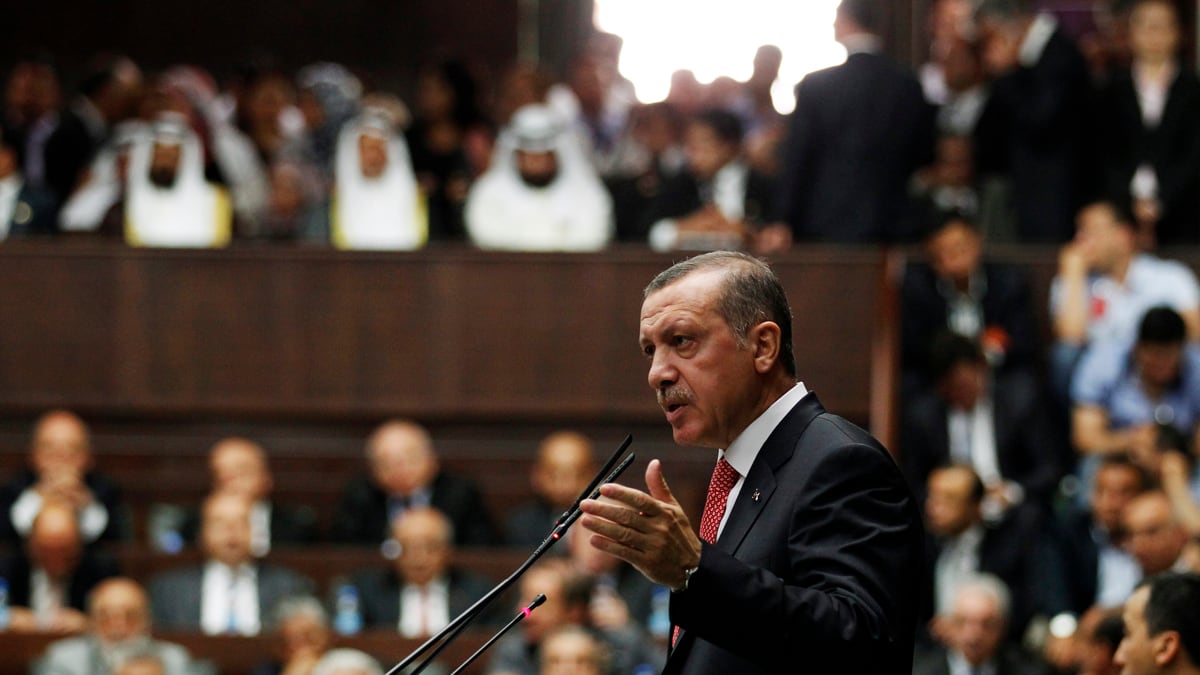Turkey called a formal meeting of NATO Tuesday after one of its warplanes was shot down by Syrian antiaircraft fire last week as the two sides traded accusations amid rising border tensions.

Turkish Prime Minister Recep Tayyip Erdogan told Parliament Tuesday that “we have passed to a new state after this incident; the rules of engagement have now changed,” and said that he was “warning the Syrian regime not to make the mistake of testing the military determination of Turkey.”
Erdogan promised angry parliamentarians that any Syrian vehicle or personnel approaching the border “will be treated as a military target and dealt with robustly.”
NATO Secretary General Anders Fogh Rasmussen promised that the alliance "expressed strong condemnation of this completely unacceptable act" and that NATO “stands together with Turkey in spirit of solidarity."
Turkish news reports showed tanks and troops being moved to reinforce the Turkish-Syrian border.
Despite Erdogan’s fighting words and the formal consultations with NATO allies in Brussels, Ankara remains wary of getting dragged into a shooting war with Syria. After a period of attempted mediation between Syria’s president Bashar al-Assad and the opposition, Turkey has been firmly in the anti-Assad camp since last October, when Erdogan called Assad “a threat to the region’s security.”
Ever since Ankara has publicly welcomed Syrian refugees into camps along the border, and privately allowed money and possibly arms to flow to rebel groups inside Syria. But Turkey has strongly resisted getting militarily involved in the growing Syrian civil war, fearing a quagmire.
“Shooting down a plane is an act of war—Erdogan has to be angry,” says one senior Western diplomat who has worked in both Syria and Turkey and who requested anonymity.
“But he is too clever to get himself into an all out war with Syria. He won’t repeat the Americans’ mistake in Iraq by putting boots on the ground.”
The Turkish F-4 phantom jet disappeared from radar screens on June 22 off the coast of Syria. Damascus later claimed that the plane was in Syrian airspace, but insisted that the plane was only identified as a Turkish fighter after the fact.
"What happened was an accident and not an assault as some like to say," Syrian foreign ministry spokesman Jihad Makdissi said Sunday.
Turkey’s military reported that a search-and-rescue plane sent to find the wreckage was also fired upon.
What Ankara fears most is that Syria will descend into a Lebanon-style proxy war between the region’s great Sunni and Shia powers, Saudi Arabia and Iran respectively. Turkish Foreign Minister Davutoglu has been shuttling between the would-be belligerents for months, warning Tehran in April against contributing to a "sectarian cold war" in the Middle East.
Turkish diplomats have also been working hard to cement Syria’s fractious political opposition, which meet regularly in Istanbul. Syria’s violence has already seeped over the border with Lebanon, with sectarian clashes breaking out last month in the northern city of Tripoli. Turkey is determined that the same seepage doesn’t happen across their own border.
The greatest immediate fear for Ankara is that a desperate al-Assad will attempt to stir the Kurdish population, which straddles the border between Syria, Turkey, Iraq and Iran, into rebellion. Syria’s estimated 2 million Kurds have a conflicted relationship with the al-Assad government. But many tribal leaders, especially in the northern border areas, have longstanding smuggling ties with Assad’s secret police. The Kurdistan Workers’ Party, a Marxist movement that has fought a 30-year separatist war with the Turkish military, which cost over 40,000 lives, also received arms and shelter from the al-Assads in the 1980s and 90s.
“The al-Assads used the Kurds as a fifth column to weaken the Turks for 20 years,” says the Western diplomat. “The [Turkish government’s] worst fear is that the stability and prosperity they have built up over the last decade will be undermined by the dying Assad regime. Ankara is very wary of giving the Syrians an excuse to stir that hornet's nest.”
The last thing Turkey needs is a shooting war with Damascus, which is lucky for Syria, whose military is dwarfed and outgunned by Turkey’s massive forces, the second largest in NATO. But at the same time, Erdogan also needs to remind the Syrians to stay in their box and stop shooting their planes—not least for his own electoral credibility. The appeal to NATO was a formality, without any call for concrete actions—but nonetheless served as a way of reminding the Syrians that the Turks are backed up by the might of the NATO alliance.
The problem is, of course, that these incidents have a tendency to take on a momentum of their own. One plane, Ankara can perhaps afford to ignore after a bit of bluster. Two, and there will be more pressure for Turkey to enforce an Iraq-style no-fly zone. That in turn would lead to calls for NATO to back up its Turkish partners. This incident marks a serious step towards a shooting war and direct Turkish and NATO intervention—though the two sides are mercifully not at the tipping point yet.






